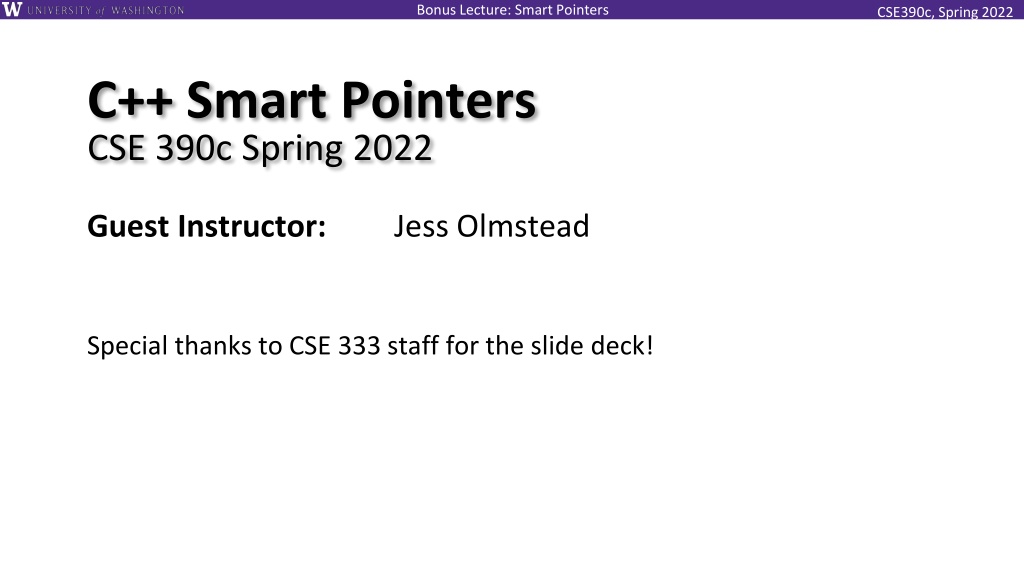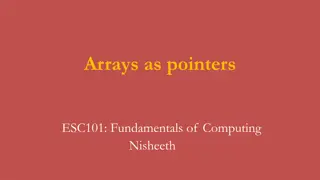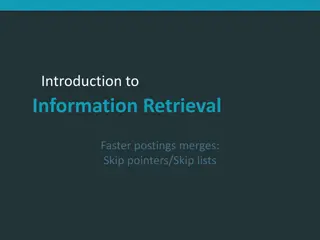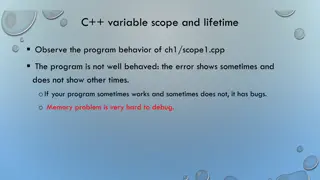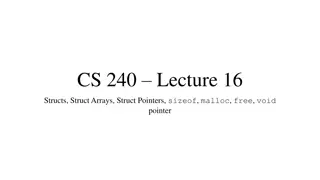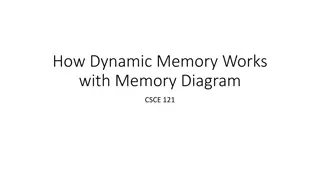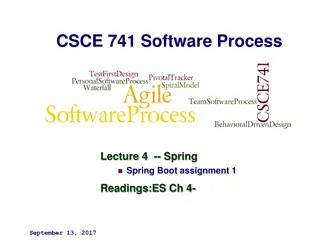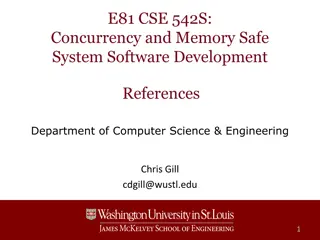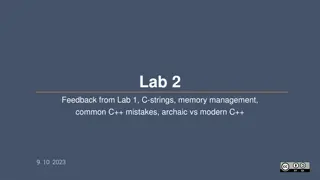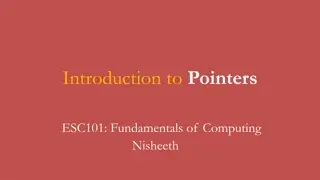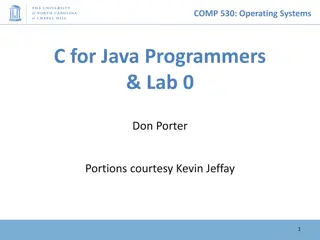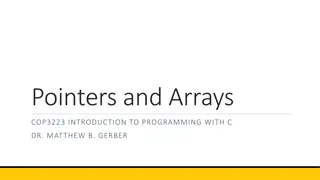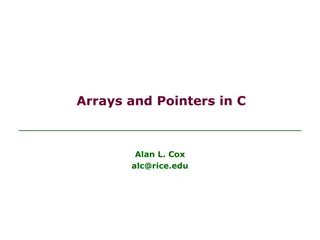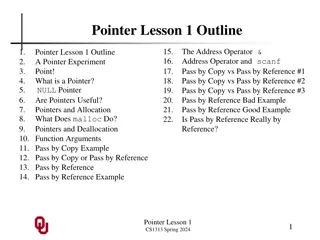Understanding Smart Pointers in C++ - Bonus Lecture CSE390c Spring 2022
Explore the concept and benefits of smart pointers in C++ as a solution to managing heap-allocated memory more effectively. Learn about avoiding memory leaks and errors when handling pointers through smart pointer implementation. Dive into a Toy Smart Pointer example using a custom class template.
Download Presentation

Please find below an Image/Link to download the presentation.
The content on the website is provided AS IS for your information and personal use only. It may not be sold, licensed, or shared on other websites without obtaining consent from the author. Download presentation by click this link. If you encounter any issues during the download, it is possible that the publisher has removed the file from their server.
E N D
Presentation Transcript
Bonus Lecture: Smart Pointers CSE390c, Spring 2022 C++ Smart Pointers CSE 390c Spring 2022 Guest Instructor: Jess Olmstead Special thanks to CSE 333 staff for the slide deck!
Bonus Lecture: Smart Pointers CSE390c, Spring 2022 Motivation We noticed that STL was doing an enormous amount of copying A solution: store pointers in containers instead of objects But who s responsible for deleting and when? Using new and delete is very error-prone We don t have to do this for stack-allocated objects! 2
Bonus Lecture: Smart Pointers CSE390c, Spring 2022 C++ Smart Pointers A smart pointer is an object that stores a pointer to a heap-allocated object A smart pointer looks and behaves like a regular C++ pointer By overloading *, ->, [], etc. These can help you manage memory The smart pointer will delete the pointed-to object at the right time including invoking the object s destructor When that is depends on what kind of smart pointer you use With correct use of smart pointers, you no longer have to remember when to delete new d memory! 3
Bonus Lecture: Smart Pointers CSE390c, Spring 2022 A Toy Smart Pointer We can implement a simple one with: A constructor that accepts a pointer A destructor that frees the pointer Overloaded * and -> operators that access the pointer 4
Bonus Lecture: Smart Pointers CSE390c, Spring 2022 ToyPtr Class Template ToyPtr.h #ifndef TOYPTR_H_ #define TOYPTR_H_ template <typename T> class ToyPtr { public: ToyPtr(T* ptr) : ptr_(ptr) { } // constructor ~ToyPtr() { delete ptr_; } // destructor T& operator*() { return *ptr_; } // * operator T* operator->() { return ptr_; } // -> operator private: T* ptr_; // the pointer itself }; #endif // TOYPTR_H_ 5
Bonus Lecture: Smart Pointers CSE390c, Spring 2022 ToyPtr Example usetoy.cc #include <iostream> #include "ToyPtr.h" // simply struct to use typedef struct { int x = 1, y = 2; } Point; std::ostream &operator<<(std::ostream &out, const Point &rhs) { return out << "(" << rhs.x << "," << rhs.y << ")"; } int main(int argc, char **argv) { // Create a dumb pointer Point *leak = new Point; // Create a "smart" pointer (OK, it's still pretty dumb) ToyPtr<Point> notleak(new Point); std::cout << " *leak: " << *leak << std::endl; std::cout << " leak->x: " << leak->x << std::endl; std::cout << " *notleak: " << *notleak << std::endl; std::cout << "notleak->x: " << notleak->x << std::endl; return EXIT_SUCCESS; } 6
Bonus Lecture: Smart Pointers CSE390c, Spring 2022 What Makes This a Toy? Can t handle: Arrays Copying Reassignment Comparison plus many other subtleties Luckily, others have built non-toy smart pointers for us! 7
Bonus Lecture: Smart Pointers CSE390c, Spring 2022 ToyPtr Class Template UseToyPtr.cc #include ./ToyPtr.h // We want two pointers! int main(int argc, char **argv) { ToyPtr<int> x(new int(5)); ToyPtr<int> y = x; return EXIT_SUCCESS; } x !! Double Delete!! 5 y 8
Bonus Lecture: Smart Pointers CSE390c, Spring 2022 Introducing: unique_ptr A unique_ptr is the sole owner of its pointee It will call delete on the pointee when it falls out of scope Enforces uniqueness by disabling copy and assignment 9
Bonus Lecture: Smart Pointers CSE390c, Spring 2022 Using unique_ptr unique1.cc #include <iostream> // for std::cout, std::endl #include <memory> // for std::unique_ptr #include <cstdlib> // for EXIT_SUCCESS Memory Leak void Leaky() { int *x = new int(5); // heap-allocated (*x)++; std::cout << *x << std::endl; } // never used delete, therefore leak 5 6 x void NotLeaky() { std::unique_ptr<int> x(new int(5)); // wrapped, heap-allocated (*x)++; std::cout << *x << std::endl; } // never used delete, but no leak x 5 6 int main(int argc, char **argv) { Leaky(); NotLeaky(); return EXIT_SUCCESS; } 10
Bonus Lecture: Smart Pointers CSE390c, Spring 2022 unique_ptrs Cannot Be Copied std::unique_ptr has disabled its copy constructor and assignment operator You cannot copy a unique_ptr, helping maintain uniqueness or ownership uniquefail.cc #include <memory> // for std::unique_ptr #include <cstdlib> // for EXIT_SUCCESS int main(int argc, char **argv) { std::unique_ptr<int> x(new int(5)); // ctor that takes a pointer cctor, disabled. compiler error default ctor, holds nullptr op=, disabled. compiler error std::unique_ptr<int> y(x); // std::unique_ptr<int> z; // z = x; // return EXIT_SUCCESS; } 11
Bonus Lecture: Smart Pointers CSE390c, Spring 2022 unique_ptr Operations unique2.cc #include <memory> // for std::unique_ptr #include <cstdlib> // for EXIT_SUCCESS 1 using namespace std; typedef struct { int a, b; } IntPair; x 5 int main(int argc, char **argv) { unique_ptr<int> x(new int(5)); ptr int *ptr = x.get(); // Return a pointer to pointed-to object int val = *x; // Return the value of pointed-to object // Access a field or function of a pointed-to object unique_ptr<IntPair> ip(new IntPair); ip->a = 100; // Deallocate current pointed-to object and store new pointer x.reset(new int(1)); ptr = x.release(); // Release responsibility for freeing delete ptr; return EXIT_SUCCESS; } 12
Bonus Lecture: Smart Pointers CSE390c, Spring 2022 Transferring Ownership Use reset() and release() to transfer ownership release returns the pointer, sets wrapped pointer to nullptr reset delete s the current pointer and stores a new one int main(int argc, char **argv) { unique_ptr<int> x(new int(5)); cout << "x: " << x.get() << endl; unique3.cc x 5 unique_ptr<int> y(x.release()); // x abdicates ownership to y cout << "x: " << x.get() << endl; // nullptr cout << "y: " << y.get() << endl; // address of 5 x y z 5 unique_ptr<int> z(new int(10)); 10 // y transfers ownership of its pointer to z. // z's old pointer was delete'd in the process. z.reset(y.release()); x y z 5 return EXIT_SUCCESS; } 10 13
Bonus Lecture: Smart Pointers CSE390c, Spring 2022 Caution with get() !! UseToyPtr.cc #include <memory> // Trying to get two pointers to the same thing int main(int argc, char **argv) { unique_ptr<int> x(new int(5)); unique_ptr<int> y(x.get()); return EXIT_SUCCESS; } x !! Double Delete!! 5 y 14
Bonus Lecture: Smart Pointers CSE390c, Spring 2022 unique_ptr and STL unique_ptrs can be stored in STL containers Wait, what? STL containers like to make lots of copies of stored objects and unique_ptrs cannot be copied Move semantics to the rescue! When supported, STL containers will move rather than copy unique_ptrs support move semantics 15
Bonus Lecture: Smart Pointers CSE390c, Spring 2022 Aside: Copy Semantics Assigning values typically means making a copy Sometimes this is what you want e.g. assigning a string to another makes a copy of its value Sometimes this is wasteful e.g. assigning a returned string goes through a temporary copy std::string ReturnString(void) { std::string x( Jess"); return x; // this return might copy } copysemantics.cc int main(int argc, char **argv) { std::string a( bleg"); std::string b(a); // copy a into b b = ReturnString(); // copy return value into b return EXIT_SUCCESS; } 16
Bonus Lecture: Smart Pointers CSE390c, Spring 2022 Aside: Move Semantics (C++11) movesemantics.cc Move semantics move values from one object to another without copying ( stealing ) Useful for optimizing away temporary copies A complex topic that uses things called rvalue references std::string ReturnString(void) { std::string x( Jess"); // this return might copy return x; } int main(int argc, char **argv) { std::string a( bleg"); // moves a to b std::string b = std::move(a); std::cout << "a: " << a << std::endl; // empty std::cout << "b: " << b << std::endl; // bleg // moves the returned value into b b = std::move(ReturnString()); std::cout << "b: " << b << std::endl; // Jess return EXIT_SUCCESS; Mostly beyond the scope of this quarter } 17
Bonus Lecture: Smart Pointers CSE390c, Spring 2022 unique_ptr and STL Example uniquevec.cc int main(int argc, char **argv) { std::vector<std::unique_ptr<int> > vec; vec.push_back(std::unique_ptr<int>(new int(9))); vec.push_back(std::unique_ptr<int>(new int(5))); vec.push_back(std::unique_ptr<int>(new int(7))); z holds 5 // int z = *vec[1]; std::cout << "z is: " << z << std::endl; compiler error! vec 9 5 7 // std::unique_ptr<int> copied = vec[1]; moved points to 5, vec[1] is nullptr moved // std::unique_ptr<int> moved = std::move(vec[1]); std::cout << "*moved: " << *moved << std::endl; std::cout << "vec[1].get(): " << vec[1].get() << std::endl; return EXIT_SUCCESS; } 18
Bonus Lecture: Smart Pointers CSE390c, Spring 2022 unique_ptr and Arrays unique_ptr can store arrays as well Will call delete[] on destruction unique5.cc #include <memory> // for std::unique_ptr #include <cstdlib> // for EXIT_SUCCESS using namespace std; int main(int argc, char **argv) { unique_ptr<int[]> x(new int[5]); x[0] = 1; x[2] = 2; return EXIT_SUCCESS; } 19
Bonus Lecture: Smart Pointers CSE390c, Spring 2022 Reference Counting Reference counting is a technique for managing resources by counting and storing the number of references (i.e. pointers that hold the address) to an object 333 p 3 int *p = new int(3); int *q = p; q = new int(33); p = new int(333); q 33 20
Bonus Lecture: Smart Pointers CSE390c, Spring 2022 std::shared_ptr shared_ptr is similar to unique_ptr but we allow shared objects to have multiple owners The copy/assign operators are not disabled and increment or decrement reference counts as needed After a copy/assign, the two shared_ptr objects point to the same pointed-to object and the (shared) reference count is 2 When a shared_ptr is destroyed, the reference count is decremented When the reference count hits 0, we delete the pointed-to object! 21
Bonus Lecture: Smart Pointers CSE390c, Spring 2022 shared_ptr Example sharedexample.cc #include <cstdlib> // for EXIT_SUCCESS #include <iostream> // for std::cout, std::endl #include <memory> // for std::shared_ptr int main(int argc, char **argv) { std::shared_ptr<int> x(new int(10)); // temporary inner scope (!) { std::shared_ptr<int> y = x; std::cout << *y << std::endl; } std::cout << *x << std::endl; return EXIT_SUCCESS; } x 10 y 22
Bonus Lecture: Smart Pointers CSE390c, Spring 2022 shared_ptrs and STL Containers Even simpler than unique_ptrs Safe to store shared_ptrs in containers, since copy/assign maintain a shared reference count sharedvec.cc vector<std::shared_ptr<int> > vec; vec.push_back(std::shared_ptr<int>(new int(9))); vec.push_back(std::shared_ptr<int>(new int(5))); vec.push_back(std::shared_ptr<int>(new int(7))); int &z = *vec[1]; std::cout << "z is: " << z << std::endl; std::shared_ptr<int> copied = vec[1]; // works! std::cout << "*copied: " << *copied << std::endl; std::shared_ptr<int> moved = std::move(vec[1]); // works! std::cout << "*moved: " << *moved << std::endl; std::cout << "vec[1].get(): " << vec[1].get() << std::endl; 23
Bonus Lecture: Smart Pointers CSE390c, Spring 2022 Cycle of shared_ptrs strongcycle.cc #include <cstdlib> #include <memory> head using std::shared_ptr; struct A { shared_ptr<A> next; shared_ptr<A> prev; }; next next int main(int argc, char **argv) { shared_ptr<A> head(new A()); head->next = shared_ptr<A>(new A()); head->next->prev = head; prev prev return EXIT_SUCCESS; } 24
Bonus Lecture: Smart Pointers CSE390c, Spring 2022 std::weak_ptr weak_ptr is similar to a shared_ptr but doesn t affect the reference count Can only point to an object that is managed by a shared_ptr Not really a pointer can t actually dereference unless you get its associated shared_ptr Because it doesn t influence the reference count, weak_ptrs can become dangling Object referenced may have been delete d But you can check to see if the object still exists Can be used to break our cycle problem! 25
Bonus Lecture: Smart Pointers CSE390c, Spring 2022 Breaking the Cycle with weak_ptr weakcycle.cc #include <cstdlib> #include <memory> head using std::shared_ptr; using std::weak_ptr; struct A { shared_ptr<A> next; weak_ptr<A> prev; }; next next int main(int argc, char **argv) { shared_ptr<A> head(new A()); head->next = shared_ptr<A>(new A()); head->next->prev = head; prev prev return EXIT_SUCCESS; } Now what happens when we delete head? 26
Bonus Lecture: Smart Pointers CSE390c, Spring 2022 Using a weak_ptr usingweak.cc #include <cstdlib> // for EXIT_SUCCESS #include <iostream> // for std::cout, std::endl #include <memory> // for std::shared_ptr, std::weak_ptr int main(int argc, char **argv) { std::weak_ptr<int> w; w { // temporary inner scope std::shared_ptr<int> x; { // temporary inner-inner scope std::shared_ptr<int> y(new int(10)); w = y; x = w.lock(); // returns "promoted" shared_ptr std::cout << *x << std::endl; } std::cout << *x << std::endl; } std::shared_ptr<int> a = w.lock(); std::cout << a << std::endl; x 10 y a return EXIT_SUCCESS; } 27
Bonus Lecture: Smart Pointers CSE390c, Spring 2022 Smart Pointers Smart pointers still don t know everything, you have to be careful with what pointers you give it to manage. Smart pointers can t tell if a pointer is on the heap or not. Still uses delete on default. Use make_unique<> and make_shared<> to allocate for you Smart pointers can t tell if you are re-using a raw pointer. 28
Bonus Lecture: Smart Pointers CSE390c, Spring 2022 Using a non-heap pointer Smart pointers can t tell if the pointer you gave points to the heap! Will still call delete on the pointer when destructed. #include <cstdlib> #include <memory> using std::shared_ptr; using std::weak_ptr; int main(int argc, char **argv) { int x = 333; shared_ptr<int> p1(&x); return EXIT_SUCCESS; } 29
Bonus Lecture: Smart Pointers CSE390c, Spring 2022 Re-using a raw pointer Smart pointers can t tell if you are re-using a raw pointer. #include <cstdlib> #include <memory> using std::unique_ptr; int main(int argc, char **argv) { int *x = new int(333); unique_ptr<int> p1(x); unique_ptr<int> p2(x); return EXIT_SUCCESS; } !! Double Delete!! 333 p1 p2 30
Bonus Lecture: Smart Pointers CSE390c, Spring 2022 Re-using a raw pointer Smart pointers can t tell if you are re-using a raw pointer. #include <cstdlib> #include <memory> using std::shared_ptr; int main(int argc, char **argv) { int *x = new int(333); shared_ptr<int> p1(x); shared_ptr<int> p2(x); return EXIT_SUCCESS; } Ref count = 1 !! Double Delete!! 333 p1 Ref count = 1 p2 31
Bonus Lecture: Smart Pointers CSE390c, Spring 2022 Re-using a raw pointer: Fixed Code Smart pointers can t tell if you are re-using a raw pointer. Takeaway: be careful!!! Safer to use cctor To be extra safe, don t have a raw pointer variable! #include <cstdlib> #include <memory> using std::shared_ptr; int main(int argc, char **argv) { int *x = new int(333); shared_ptr<int> p1(new int(333)); // OR this (Since C++14) shared_ptr<int> p1 = std::make_shared<int>(333); shared_ptr<int> p2(p1); return EXIT_SUCCESS; } 32
Bonus Lecture: Smart Pointers CSE390c, Spring 2022 Summary A unique_ptr takes ownership of a pointer Cannot be copied, but can be moved get() returns a copy of the pointer, but is dangerous to use; better to use release() instead reset() deletes old pointer value and stores a new one A shared_ptr allows shared objects to have multiple owners by doing reference counting deletes an object once its reference count reaches zero A weak_ptr works with a shared object but doesn t affect the reference count Can t actually be dereferenced, but can check if the object still exists and can get a shared_ptr from the weak_ptr if it does 33
Bonus Lecture: Smart Pointers CSE390c, Spring 2022 Some Important Smart Pointer Methods Visit http://www.cplusplus.com/ for more information on these! std::unique_ptr U; U.get() U.release() U.reset(q) Returns the raw pointer U is managing U stops managing its raw pointer and returns the raw pointer U cleans up its raw pointer and takes ownership of q std::shared_ptr S; S.get() S.use_count() S.unique() Returns the raw pointer S is managing Returns the reference count Returns true iff S.use_count() == 1 std::weak_ptr W; W.lock() W.use_count() W.expired() Constructs a shared pointer based off of W and returns it Returns the reference count Returns true iff W is expired (W.use_count() == 0) 34
Bonus Lecture: Smart Pointers CSE390c, Spring 2022 Key Takeaways Modern C++ convention is pretty much never use new/delete It s just too error prone. We have these tools to prevent mistakes now This is why C++14 added the make_unique and make_shared function So we don t have to pass in a new d pointer Still not a perfect solution, nor foolproof Seems a bit clunky ? Try Rust :) Come to Wednesday s lecture! We don t have to use the heap nearly as frequently as we think Stick to the stack when possible! Collections will manage the heap for you (vector, string, etc) I wrote my entire capstone project (in Rust) without allocating memory manually at all
Bonus Lecture: Smart Pointers CSE390c, Spring 2022 Aside: Smart Ptrs vs. Garbage Collection Are smart pointers a form of garbage collection? No? Maybe ? They serve the same purpose, but differently There are substantial advantages to each Smart pointers: Deterministic runtime very important :) Control over lifetime of objects better for small memory footprint Garbage collection: Even safer (memory-leak wise). I.e. with cycles Can put off gc overhead until safe times in execution Or offload to other cores/threads To (roughly) quote the inventor of Lua (a garbage collected language): I still wouldn t want to ride on a plane/rocket running on a garbage collected language
